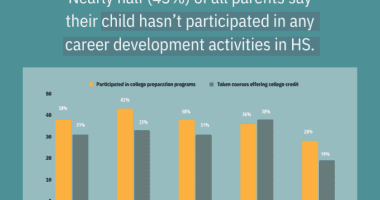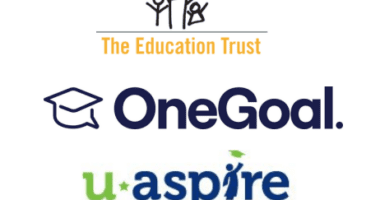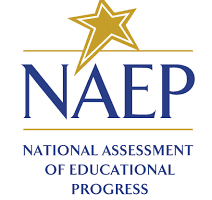Statewide Parent Poll Highlights Ongoing Concerns for Students’ Social, Emotional, and Academic Development and Mental Health in Massachusetts
BOSTON (May 24, 2023) – As decision-makers continue to discuss how to best tackle students’ unfinished learning amid a time of post-pandemic recovery, a new poll released today by The Education Trust in Massachusetts finds that parents remain concerned about their child’s social, emotional, and academic development and mental health — with heightened concerns among systemically underserved populations.
The statewide poll, conducted by The MassINC Polling Group, finds that although the majority of parents (77%) offer A’s or B’s to their child’s school when it comes to their overall satisfaction so far this school year, 22% of parents are still offering grades of C through F, which is still above pre-pandemic levels. Parents’ evaluation of this school year includes many factors related to academic development and how it will affect their child’s learning and future: 37% say they are “very or somewhat” concerned about their child’s academic progress this school year. These feelings are especially prevalent amongst Black (45%) and Latino (44%) parents, parents of students with an individual education plan (IEP (55%), and parents of English learners (60%), compared to 35% of White parents.
“What we are hearing from parents is not surprising, but it’s still troubling and disheartening that throughout many polls in this series spanning the height of the pandemic, an overwhelming number of parents, especially parents of color, parents of English learners, parents of students with IEPs, and families from low-income backgrounds continue to be deeply concerned about their child’s academics, safety, and emotional well-being,” said Genesis Carela, state policy associate for The Education Trust in Massachusetts. “It’s important, now more than ever, that Massachusetts’ leaders prioritize providing significant funding increases for our education system while ensuring that state and local leaders, administrators, and teachers are working collaboratively to ensure every child in Massachusetts has access to the proper supports and resources to learn and thrive safely.”
In addition to academics, parents also consider a variety of other factors when grading their child’s school. For example, parents have expressed concerns about their children’s mental health throughout the pandemic. Although these concerns have slightly declined, 45% of parents still say they are “very or somewhat” concerned; parents that are “very concerned” are less likely to think the school has enough resources to offer help to students who need it (47%). Bullying, violence, and school safety were all common concerns among parents, particularly Black and Latino parents. Only 40% of Black parents and 40% of Latino parents say their child is “very safe” from violence while at school, compared to 50% of White parents. When it comes to bullying, more than 1 in 4 (28%) parents say their child has experienced bullying this year. Among Black parents (35%), parents of English learners (40%), and parents who see their child as behind grade level (42%), bullying is even more prevalent.
“This survey series lets policymakers hear the voices of parents and families across the state who often don’t have a seat at the table when important decisions are made,” said Steve Koczela, President of The MassINC Polling Group, which oversaw the poll. “Parents have been through a lot these last few years, and this survey gives voice to the challenges they continue to face.”
Key Poll Findings:
Academic
- In all, 77% of parents see their child as at or ahead of grade level, though the percentage who see their child as behind (20%) is still above pre-pandemic levels.
- A majority of parents (87%) say they are at least “somewhat satisfied” with the quality of education this school year — with parents who offer their child’s school lower grades expressing less satisfaction with the quality of their child’s education (42% “very or somewhat” dissatisfied).
- Just half of parents of English learners report that services for English learners have improved this school year (50%), while more than a third (34%) say they have stayed the same.
Extracurricular Activities
- Most parents (80%) say their child’s school offers some extracurricular activities, with more opportunities available for middle and high school students. About half of White parents (52%) report having the same amount of extracurricular activities offered as before the pandemic. Yet, only 35% of Black and 38% of Latino parents say the same.
- Among parents who say extracurricular activities are available, they report time of day (28%), transportation (27%), and cost (24%) as barriers to their child’s participation.
School Safety
- A majority of parents (73%) say they are at least “somewhat familiar” with their child’s school bullying policies and procedures. Yet, 28% of parents who say their child has been bullied are “very satisfied” with the school bullying protocols.
- About 1 in 4 parents (26%) say an incident requiring a lockdown this school year has occurred — with parents of older children more likely to say there has been an incident.
- Most parents (42%) say they are unsure if their child’s school has alternative approaches to address school discipline issues. Among parents who report their school using alternative approaches, parents of color are more likely to describe them as “very or somewhat effective”: 87% of Black parents and 85% of Latino parents.
“The striking challenges children have endured – particularly students of color and students from low-income families – remain very real consequences of the pandemic,” said Leon Smith, Executive Director of Citizens for Juvenile Justice (CFJJ). “Many students need for their schools to be an understanding and welcoming space that not only provides them with opportunities to learn and grow but to help meet their basic and psychological needs — and far too many parents across the Commonwealth are saying this isn’t the case.
“As our state continues to map out the next phase of educational improvements, we must ensure that means discussing ways to create physically safe and emotionally supportive school environments for all students. But we must ensure the proposed solutions are not narrowly limited to what many lawmakers and school leaders nationwide are proposing — to move to ‘harden’ schools with more surveillance, metal detectors, and school resource officers (SROs). Instead, we must advance and fund alternative approaches that center and address student needs, help build authentic relationships between teachers and students, invest in more support personnel to provide social and emotional support, and adopt restorative practices with fidelity to de-escalate conflicts and shift school culture proactively,” Smith continued.
###
BACKGROUND: 1,539 parents of K-12 students in Massachusetts, including oversamples of Black, Latino, and Asian parents, were polled (live telephone and online interviews) in English and Spanish from April 10 – April 30, 2023.
This poll is the latest in a series of eight waves of polling going back to mid-2020, made possible by support from The Barr Foundation. The poll will be highlighted at a hybrid event featuring special remarks by Lieutenant Governor Kim Driscoll, followed by a panel discussion with Massachusetts parents, policymakers, and practitioners from 9 –10:30 a.m. on Wednesday, May 24, 2023, at Suffolk University. Registration is free, and the event is open to the public: register to participate in person or virtually.







